Taxation Law: Determining Taxable Income and Allowable Deductions
VerifiedAdded on 2023/06/13
|9
|1928
|191
AI Summary
This article discusses the determination of taxable income and allowable deductions under section 6-5 and section 8-1 of the ITAA 1997. It also covers the taxation ruling of TR 98/9 and TR 97/23. The case laws of Scott v Commissioner of Taxation (1935), Ronpibon Tin NL v Federal Commissioner of Taxation (1949), Mansfield v Federal Commissioner of Taxation, and Western Suburbs Cinemas v Federal Commissioner of Taxation (1952) are also discussed. The article concludes with the computation of taxable income and tax payable for the year 2017/18.
Contribute Materials
Your contribution can guide someone’s learning journey. Share your
documents today.
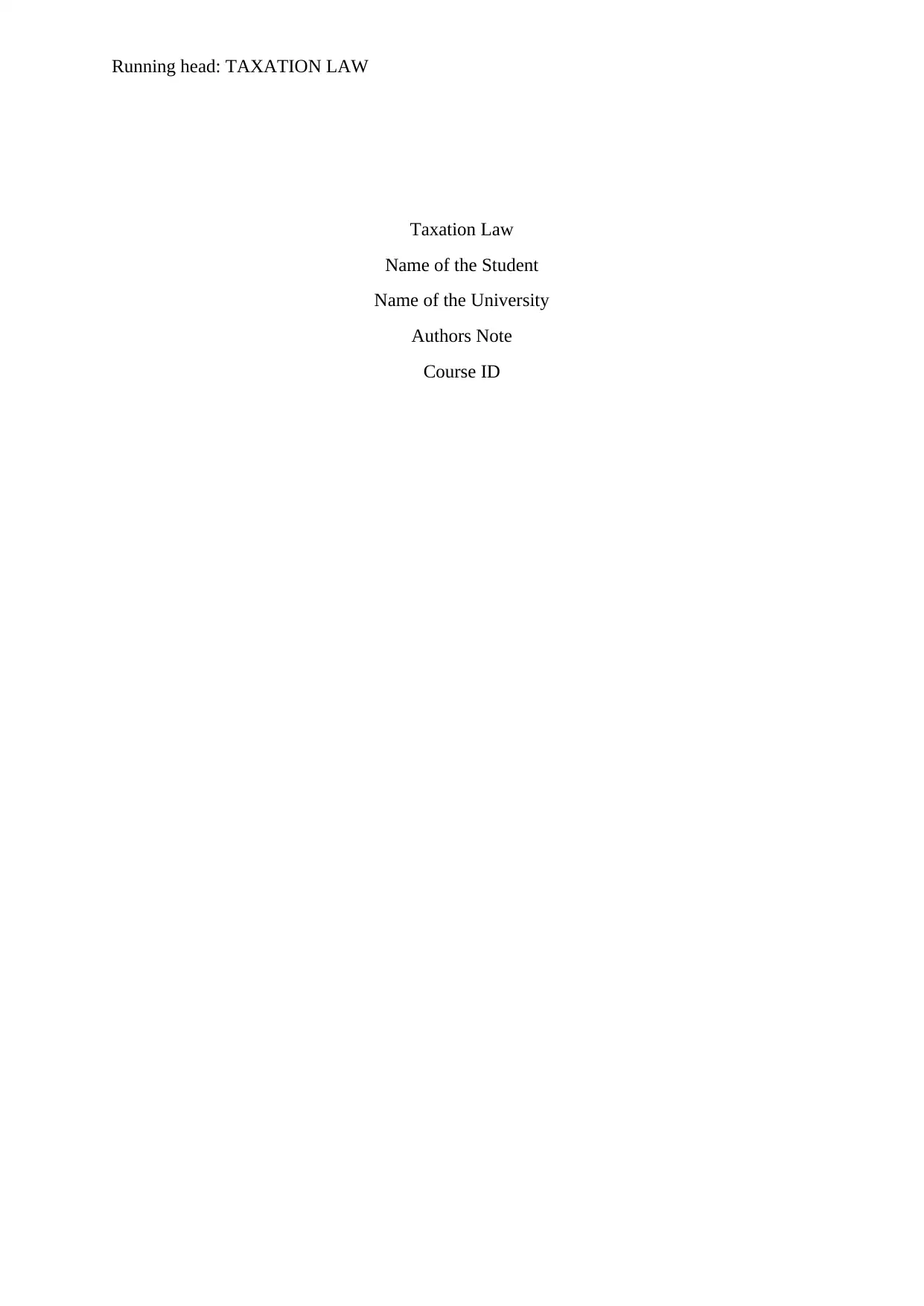
Running head: TAXATION LAW
Taxation Law
Name of the Student
Name of the University
Authors Note
Course ID
Taxation Law
Name of the Student
Name of the University
Authors Note
Course ID
Secure Best Marks with AI Grader
Need help grading? Try our AI Grader for instant feedback on your assignments.
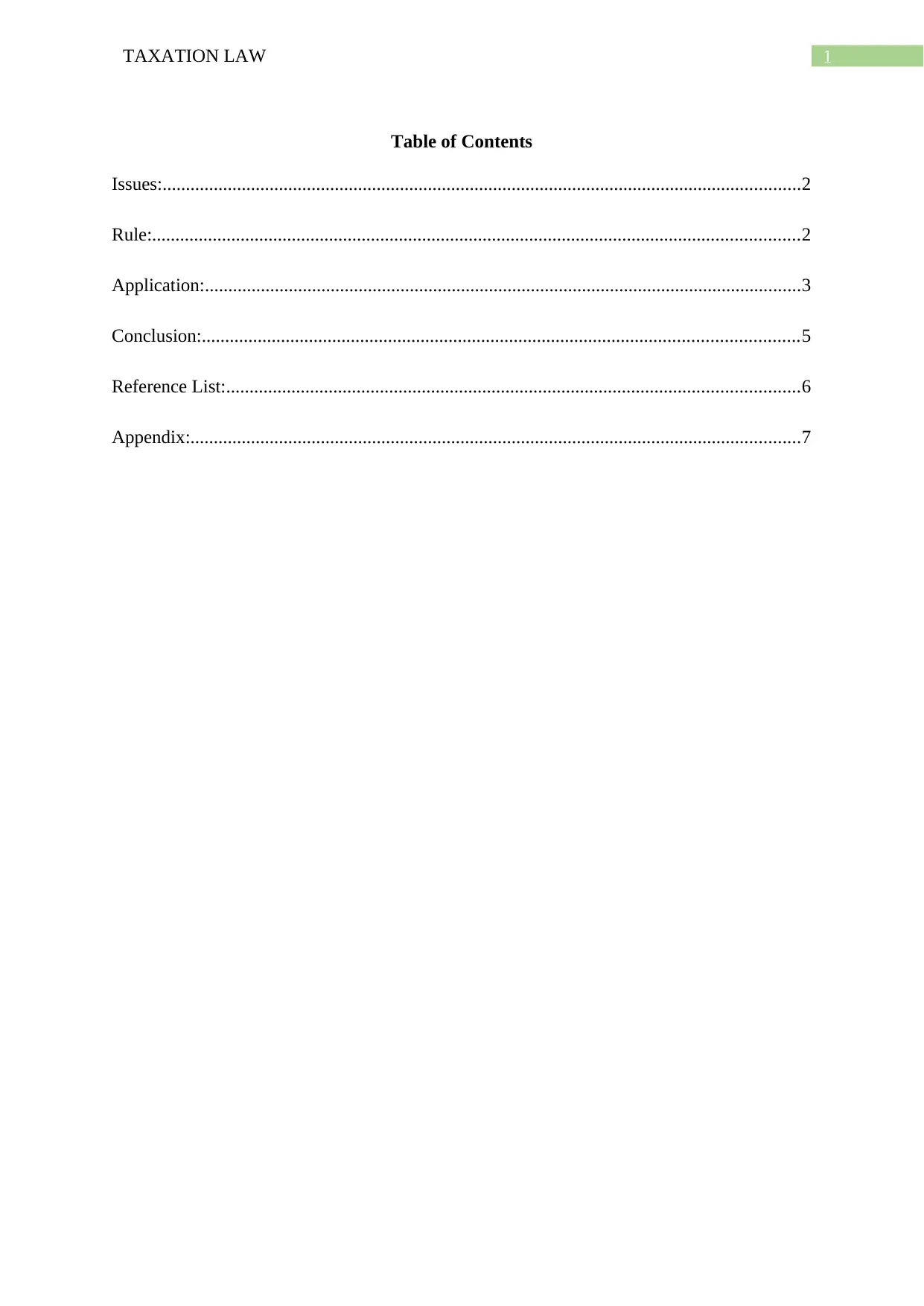
1TAXATION LAW
Table of Contents
Issues:.........................................................................................................................................2
Rule:...........................................................................................................................................2
Application:................................................................................................................................3
Conclusion:................................................................................................................................5
Reference List:...........................................................................................................................6
Appendix:...................................................................................................................................7
Table of Contents
Issues:.........................................................................................................................................2
Rule:...........................................................................................................................................2
Application:................................................................................................................................3
Conclusion:................................................................................................................................5
Reference List:...........................................................................................................................6
Appendix:...................................................................................................................................7
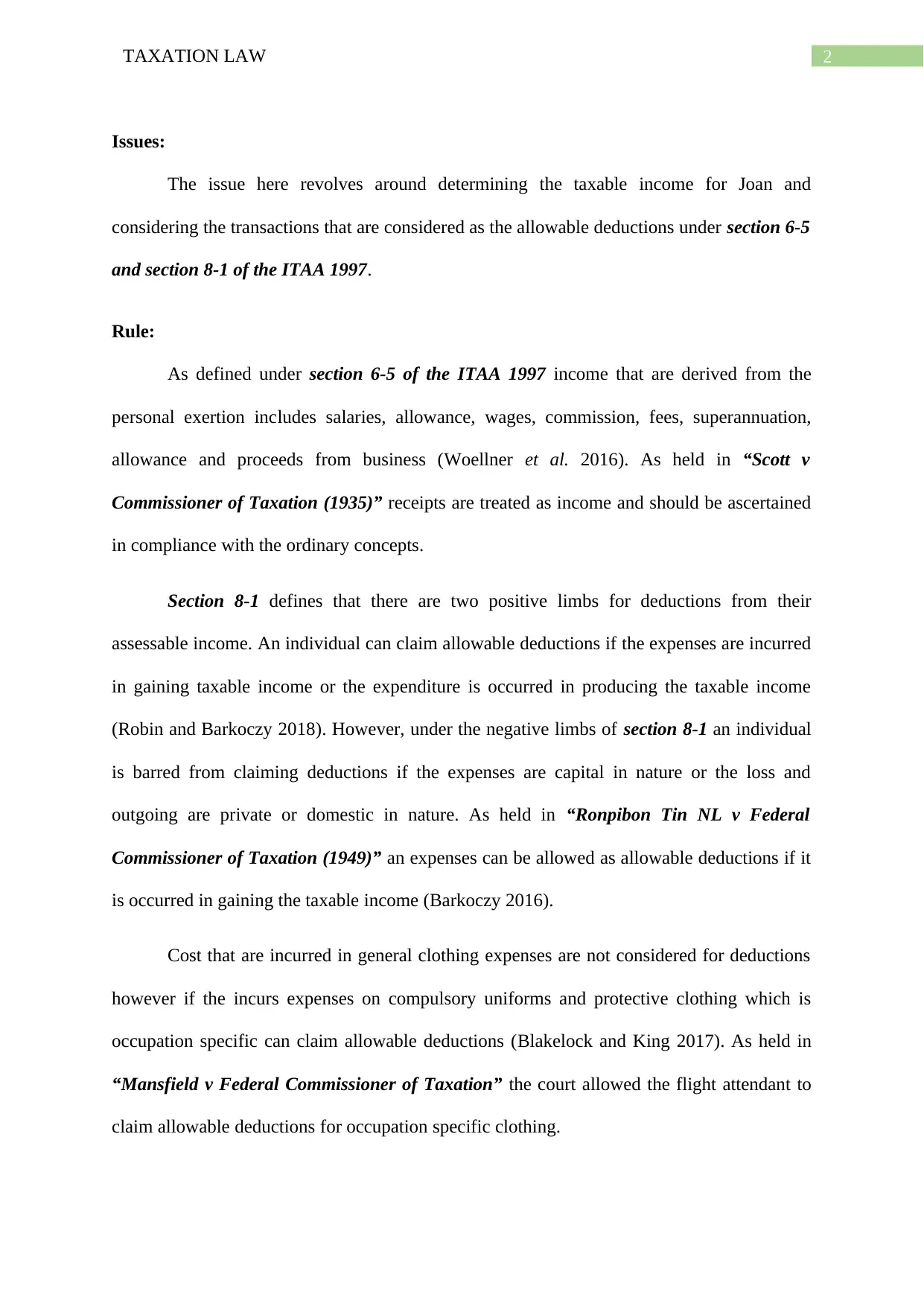
2TAXATION LAW
Issues:
The issue here revolves around determining the taxable income for Joan and
considering the transactions that are considered as the allowable deductions under section 6-5
and section 8-1 of the ITAA 1997.
Rule:
As defined under section 6-5 of the ITAA 1997 income that are derived from the
personal exertion includes salaries, allowance, wages, commission, fees, superannuation,
allowance and proceeds from business (Woellner et al. 2016). As held in “Scott v
Commissioner of Taxation (1935)” receipts are treated as income and should be ascertained
in compliance with the ordinary concepts.
Section 8-1 defines that there are two positive limbs for deductions from their
assessable income. An individual can claim allowable deductions if the expenses are incurred
in gaining taxable income or the expenditure is occurred in producing the taxable income
(Robin and Barkoczy 2018). However, under the negative limbs of section 8-1 an individual
is barred from claiming deductions if the expenses are capital in nature or the loss and
outgoing are private or domestic in nature. As held in “Ronpibon Tin NL v Federal
Commissioner of Taxation (1949)” an expenses can be allowed as allowable deductions if it
is occurred in gaining the taxable income (Barkoczy 2016).
Cost that are incurred in general clothing expenses are not considered for deductions
however if the incurs expenses on compulsory uniforms and protective clothing which is
occupation specific can claim allowable deductions (Blakelock and King 2017). As held in
“Mansfield v Federal Commissioner of Taxation” the court allowed the flight attendant to
claim allowable deductions for occupation specific clothing.
Issues:
The issue here revolves around determining the taxable income for Joan and
considering the transactions that are considered as the allowable deductions under section 6-5
and section 8-1 of the ITAA 1997.
Rule:
As defined under section 6-5 of the ITAA 1997 income that are derived from the
personal exertion includes salaries, allowance, wages, commission, fees, superannuation,
allowance and proceeds from business (Woellner et al. 2016). As held in “Scott v
Commissioner of Taxation (1935)” receipts are treated as income and should be ascertained
in compliance with the ordinary concepts.
Section 8-1 defines that there are two positive limbs for deductions from their
assessable income. An individual can claim allowable deductions if the expenses are incurred
in gaining taxable income or the expenditure is occurred in producing the taxable income
(Robin and Barkoczy 2018). However, under the negative limbs of section 8-1 an individual
is barred from claiming deductions if the expenses are capital in nature or the loss and
outgoing are private or domestic in nature. As held in “Ronpibon Tin NL v Federal
Commissioner of Taxation (1949)” an expenses can be allowed as allowable deductions if it
is occurred in gaining the taxable income (Barkoczy 2016).
Cost that are incurred in general clothing expenses are not considered for deductions
however if the incurs expenses on compulsory uniforms and protective clothing which is
occupation specific can claim allowable deductions (Blakelock and King 2017). As held in
“Mansfield v Federal Commissioner of Taxation” the court allowed the flight attendant to
claim allowable deductions for occupation specific clothing.
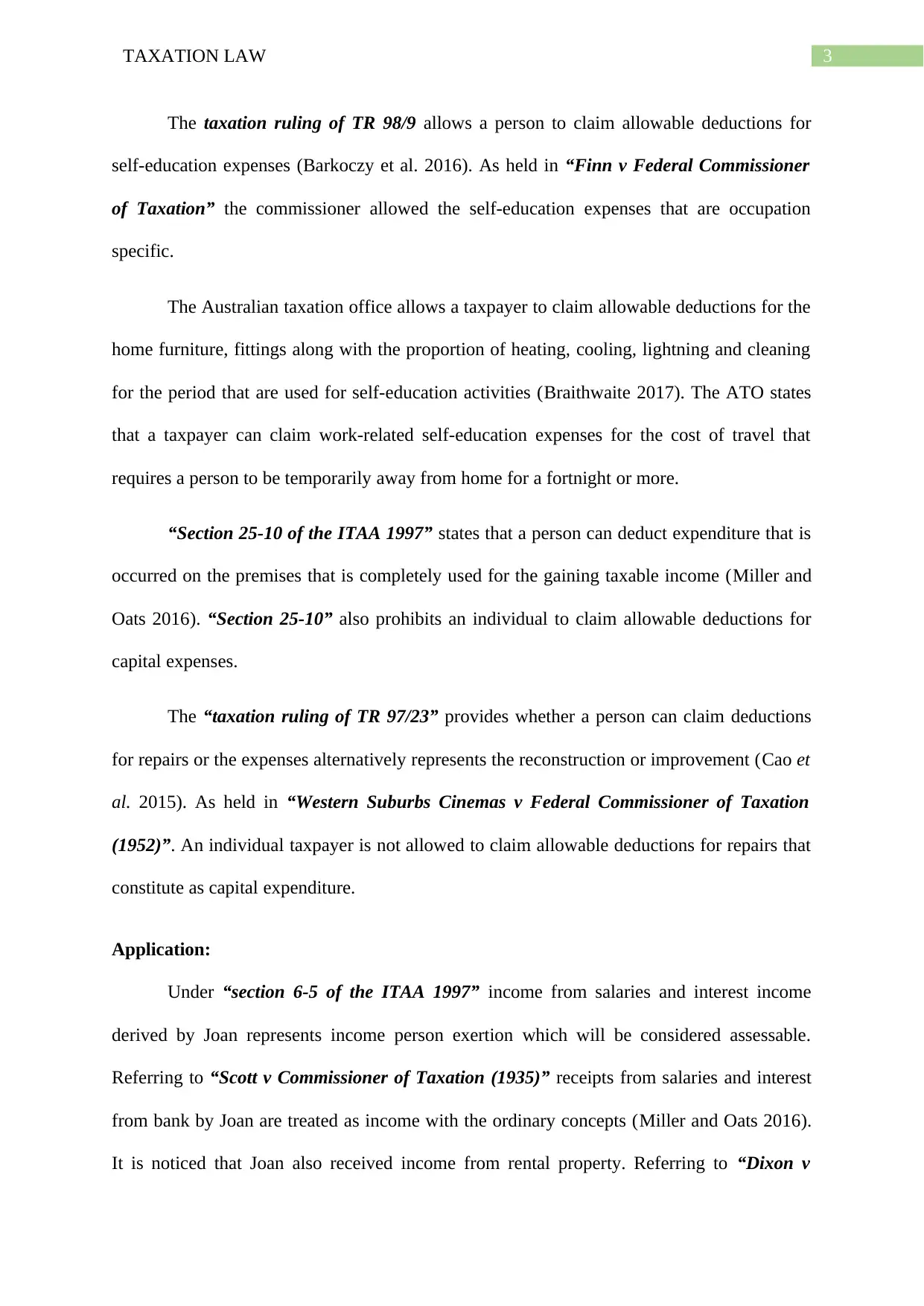
3TAXATION LAW
The taxation ruling of TR 98/9 allows a person to claim allowable deductions for
self-education expenses (Barkoczy et al. 2016). As held in “Finn v Federal Commissioner
of Taxation” the commissioner allowed the self-education expenses that are occupation
specific.
The Australian taxation office allows a taxpayer to claim allowable deductions for the
home furniture, fittings along with the proportion of heating, cooling, lightning and cleaning
for the period that are used for self-education activities (Braithwaite 2017). The ATO states
that a taxpayer can claim work-related self-education expenses for the cost of travel that
requires a person to be temporarily away from home for a fortnight or more.
“Section 25-10 of the ITAA 1997” states that a person can deduct expenditure that is
occurred on the premises that is completely used for the gaining taxable income (Miller and
Oats 2016). “Section 25-10” also prohibits an individual to claim allowable deductions for
capital expenses.
The “taxation ruling of TR 97/23” provides whether a person can claim deductions
for repairs or the expenses alternatively represents the reconstruction or improvement (Cao et
al. 2015). As held in “Western Suburbs Cinemas v Federal Commissioner of Taxation
(1952)”. An individual taxpayer is not allowed to claim allowable deductions for repairs that
constitute as capital expenditure.
Application:
Under “section 6-5 of the ITAA 1997” income from salaries and interest income
derived by Joan represents income person exertion which will be considered assessable.
Referring to “Scott v Commissioner of Taxation (1935)” receipts from salaries and interest
from bank by Joan are treated as income with the ordinary concepts (Miller and Oats 2016).
It is noticed that Joan also received income from rental property. Referring to “Dixon v
The taxation ruling of TR 98/9 allows a person to claim allowable deductions for
self-education expenses (Barkoczy et al. 2016). As held in “Finn v Federal Commissioner
of Taxation” the commissioner allowed the self-education expenses that are occupation
specific.
The Australian taxation office allows a taxpayer to claim allowable deductions for the
home furniture, fittings along with the proportion of heating, cooling, lightning and cleaning
for the period that are used for self-education activities (Braithwaite 2017). The ATO states
that a taxpayer can claim work-related self-education expenses for the cost of travel that
requires a person to be temporarily away from home for a fortnight or more.
“Section 25-10 of the ITAA 1997” states that a person can deduct expenditure that is
occurred on the premises that is completely used for the gaining taxable income (Miller and
Oats 2016). “Section 25-10” also prohibits an individual to claim allowable deductions for
capital expenses.
The “taxation ruling of TR 97/23” provides whether a person can claim deductions
for repairs or the expenses alternatively represents the reconstruction or improvement (Cao et
al. 2015). As held in “Western Suburbs Cinemas v Federal Commissioner of Taxation
(1952)”. An individual taxpayer is not allowed to claim allowable deductions for repairs that
constitute as capital expenditure.
Application:
Under “section 6-5 of the ITAA 1997” income from salaries and interest income
derived by Joan represents income person exertion which will be considered assessable.
Referring to “Scott v Commissioner of Taxation (1935)” receipts from salaries and interest
from bank by Joan are treated as income with the ordinary concepts (Miller and Oats 2016).
It is noticed that Joan also received income from rental property. Referring to “Dixon v
Secure Best Marks with AI Grader
Need help grading? Try our AI Grader for instant feedback on your assignments.
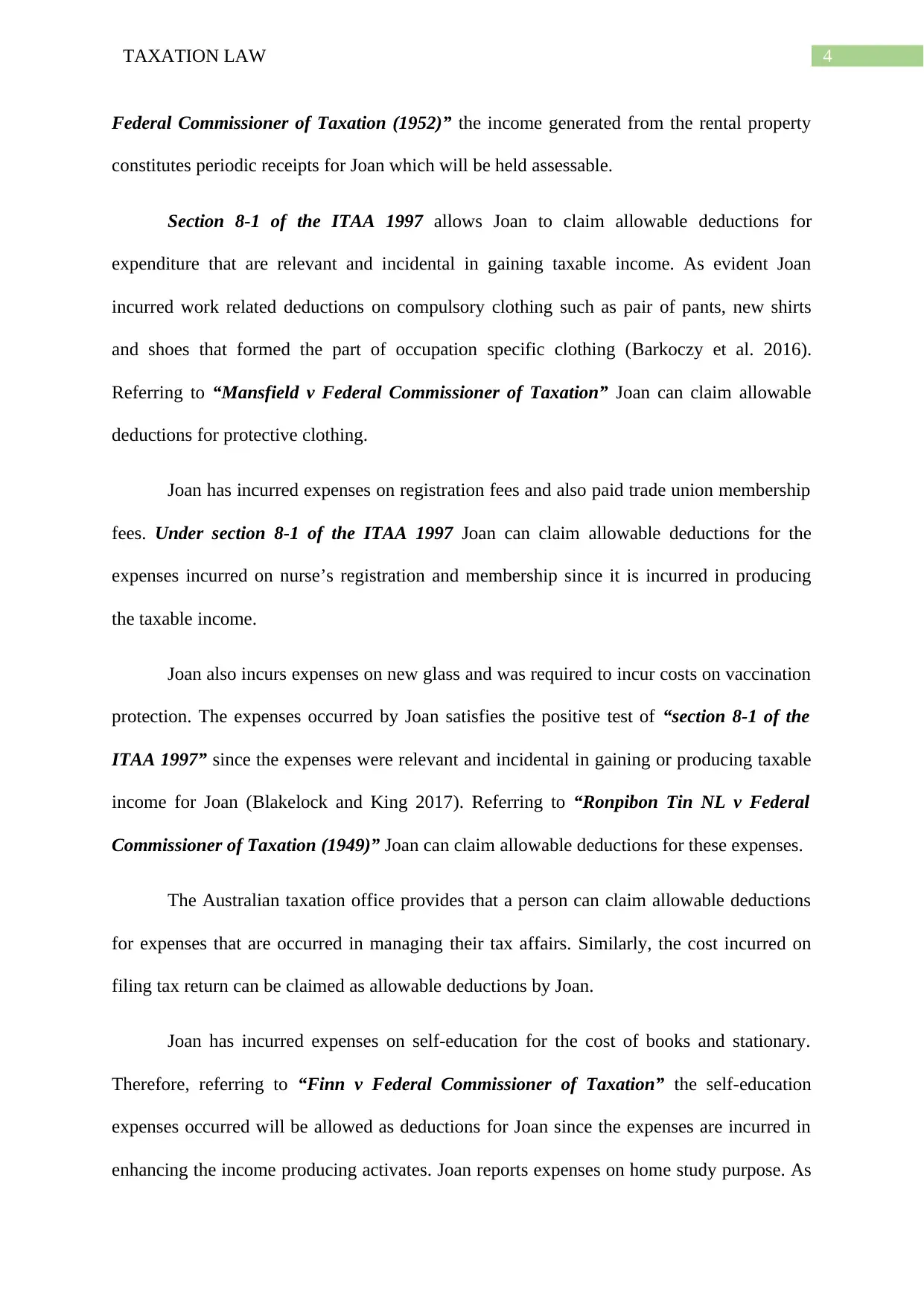
4TAXATION LAW
Federal Commissioner of Taxation (1952)” the income generated from the rental property
constitutes periodic receipts for Joan which will be held assessable.
Section 8-1 of the ITAA 1997 allows Joan to claim allowable deductions for
expenditure that are relevant and incidental in gaining taxable income. As evident Joan
incurred work related deductions on compulsory clothing such as pair of pants, new shirts
and shoes that formed the part of occupation specific clothing (Barkoczy et al. 2016).
Referring to “Mansfield v Federal Commissioner of Taxation” Joan can claim allowable
deductions for protective clothing.
Joan has incurred expenses on registration fees and also paid trade union membership
fees. Under section 8-1 of the ITAA 1997 Joan can claim allowable deductions for the
expenses incurred on nurse’s registration and membership since it is incurred in producing
the taxable income.
Joan also incurs expenses on new glass and was required to incur costs on vaccination
protection. The expenses occurred by Joan satisfies the positive test of “section 8-1 of the
ITAA 1997” since the expenses were relevant and incidental in gaining or producing taxable
income for Joan (Blakelock and King 2017). Referring to “Ronpibon Tin NL v Federal
Commissioner of Taxation (1949)” Joan can claim allowable deductions for these expenses.
The Australian taxation office provides that a person can claim allowable deductions
for expenses that are occurred in managing their tax affairs. Similarly, the cost incurred on
filing tax return can be claimed as allowable deductions by Joan.
Joan has incurred expenses on self-education for the cost of books and stationary.
Therefore, referring to “Finn v Federal Commissioner of Taxation” the self-education
expenses occurred will be allowed as deductions for Joan since the expenses are incurred in
enhancing the income producing activates. Joan reports expenses on home study purpose. As
Federal Commissioner of Taxation (1952)” the income generated from the rental property
constitutes periodic receipts for Joan which will be held assessable.
Section 8-1 of the ITAA 1997 allows Joan to claim allowable deductions for
expenditure that are relevant and incidental in gaining taxable income. As evident Joan
incurred work related deductions on compulsory clothing such as pair of pants, new shirts
and shoes that formed the part of occupation specific clothing (Barkoczy et al. 2016).
Referring to “Mansfield v Federal Commissioner of Taxation” Joan can claim allowable
deductions for protective clothing.
Joan has incurred expenses on registration fees and also paid trade union membership
fees. Under section 8-1 of the ITAA 1997 Joan can claim allowable deductions for the
expenses incurred on nurse’s registration and membership since it is incurred in producing
the taxable income.
Joan also incurs expenses on new glass and was required to incur costs on vaccination
protection. The expenses occurred by Joan satisfies the positive test of “section 8-1 of the
ITAA 1997” since the expenses were relevant and incidental in gaining or producing taxable
income for Joan (Blakelock and King 2017). Referring to “Ronpibon Tin NL v Federal
Commissioner of Taxation (1949)” Joan can claim allowable deductions for these expenses.
The Australian taxation office provides that a person can claim allowable deductions
for expenses that are occurred in managing their tax affairs. Similarly, the cost incurred on
filing tax return can be claimed as allowable deductions by Joan.
Joan has incurred expenses on self-education for the cost of books and stationary.
Therefore, referring to “Finn v Federal Commissioner of Taxation” the self-education
expenses occurred will be allowed as deductions for Joan since the expenses are incurred in
enhancing the income producing activates. Joan reports expenses on home study purpose. As
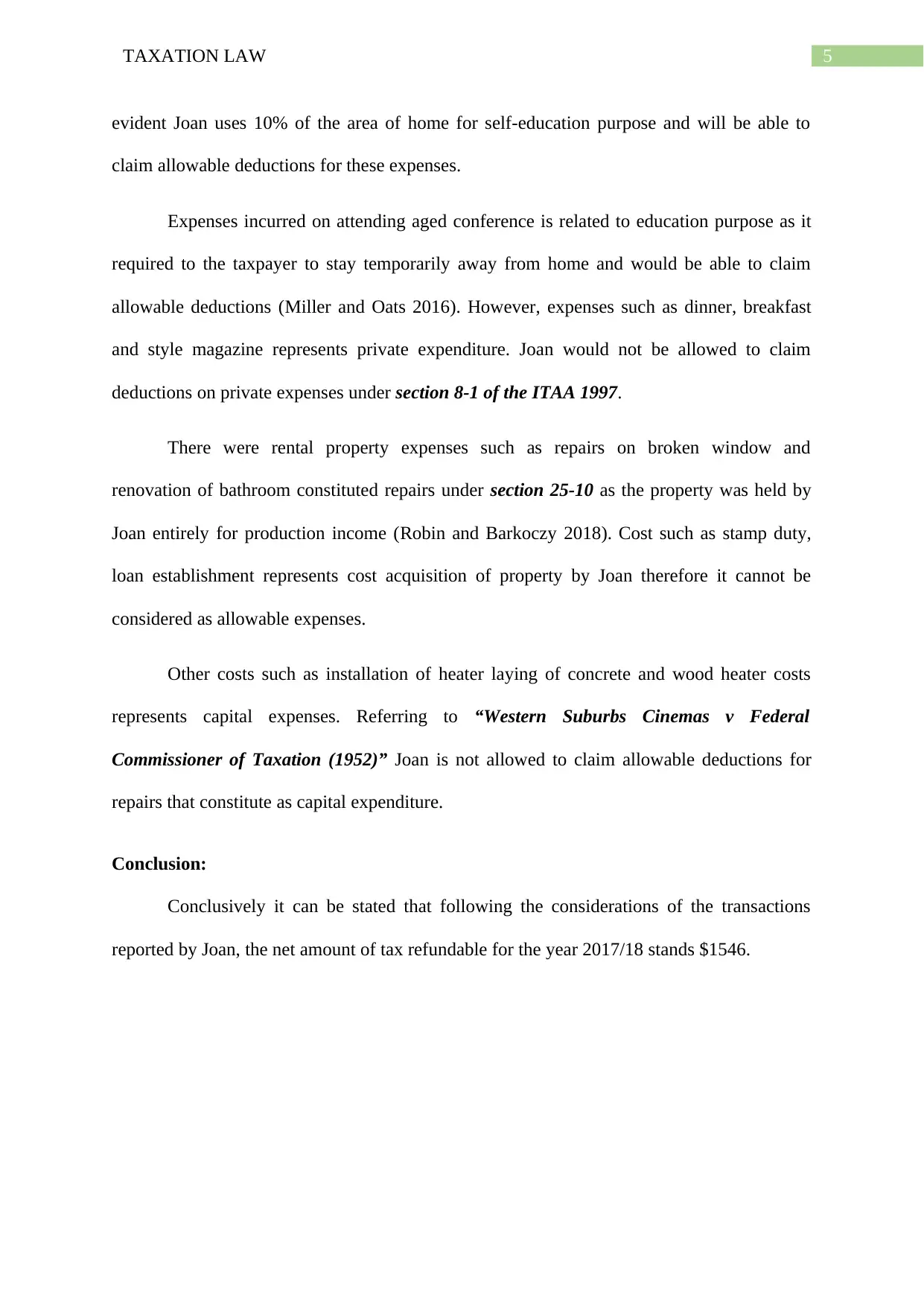
5TAXATION LAW
evident Joan uses 10% of the area of home for self-education purpose and will be able to
claim allowable deductions for these expenses.
Expenses incurred on attending aged conference is related to education purpose as it
required to the taxpayer to stay temporarily away from home and would be able to claim
allowable deductions (Miller and Oats 2016). However, expenses such as dinner, breakfast
and style magazine represents private expenditure. Joan would not be allowed to claim
deductions on private expenses under section 8-1 of the ITAA 1997.
There were rental property expenses such as repairs on broken window and
renovation of bathroom constituted repairs under section 25-10 as the property was held by
Joan entirely for production income (Robin and Barkoczy 2018). Cost such as stamp duty,
loan establishment represents cost acquisition of property by Joan therefore it cannot be
considered as allowable expenses.
Other costs such as installation of heater laying of concrete and wood heater costs
represents capital expenses. Referring to “Western Suburbs Cinemas v Federal
Commissioner of Taxation (1952)” Joan is not allowed to claim allowable deductions for
repairs that constitute as capital expenditure.
Conclusion:
Conclusively it can be stated that following the considerations of the transactions
reported by Joan, the net amount of tax refundable for the year 2017/18 stands $1546.
evident Joan uses 10% of the area of home for self-education purpose and will be able to
claim allowable deductions for these expenses.
Expenses incurred on attending aged conference is related to education purpose as it
required to the taxpayer to stay temporarily away from home and would be able to claim
allowable deductions (Miller and Oats 2016). However, expenses such as dinner, breakfast
and style magazine represents private expenditure. Joan would not be allowed to claim
deductions on private expenses under section 8-1 of the ITAA 1997.
There were rental property expenses such as repairs on broken window and
renovation of bathroom constituted repairs under section 25-10 as the property was held by
Joan entirely for production income (Robin and Barkoczy 2018). Cost such as stamp duty,
loan establishment represents cost acquisition of property by Joan therefore it cannot be
considered as allowable expenses.
Other costs such as installation of heater laying of concrete and wood heater costs
represents capital expenses. Referring to “Western Suburbs Cinemas v Federal
Commissioner of Taxation (1952)” Joan is not allowed to claim allowable deductions for
repairs that constitute as capital expenditure.
Conclusion:
Conclusively it can be stated that following the considerations of the transactions
reported by Joan, the net amount of tax refundable for the year 2017/18 stands $1546.
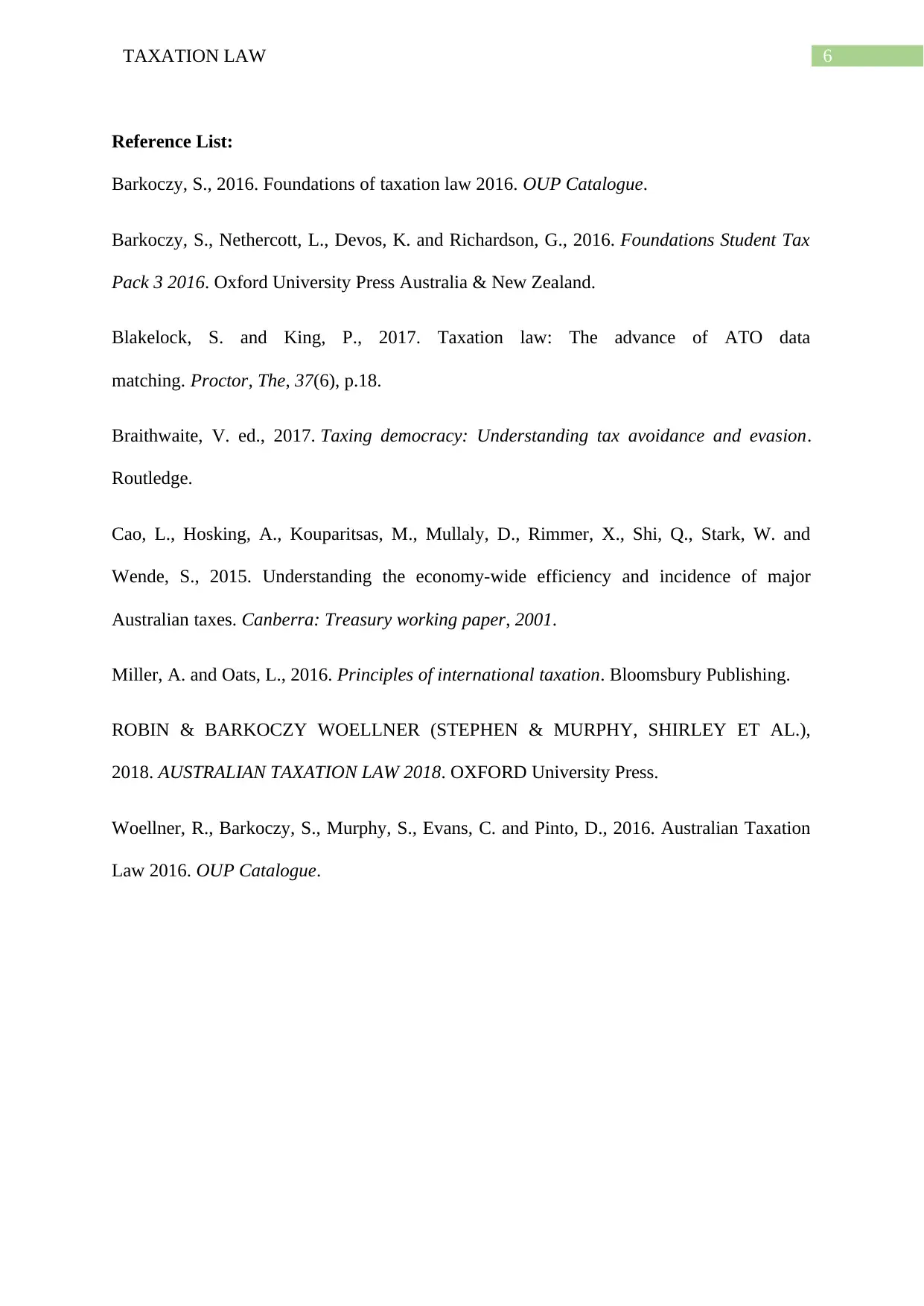
6TAXATION LAW
Reference List:
Barkoczy, S., 2016. Foundations of taxation law 2016. OUP Catalogue.
Barkoczy, S., Nethercott, L., Devos, K. and Richardson, G., 2016. Foundations Student Tax
Pack 3 2016. Oxford University Press Australia & New Zealand.
Blakelock, S. and King, P., 2017. Taxation law: The advance of ATO data
matching. Proctor, The, 37(6), p.18.
Braithwaite, V. ed., 2017. Taxing democracy: Understanding tax avoidance and evasion.
Routledge.
Cao, L., Hosking, A., Kouparitsas, M., Mullaly, D., Rimmer, X., Shi, Q., Stark, W. and
Wende, S., 2015. Understanding the economy-wide efficiency and incidence of major
Australian taxes. Canberra: Treasury working paper, 2001.
Miller, A. and Oats, L., 2016. Principles of international taxation. Bloomsbury Publishing.
ROBIN & BARKOCZY WOELLNER (STEPHEN & MURPHY, SHIRLEY ET AL.),
2018. AUSTRALIAN TAXATION LAW 2018. OXFORD University Press.
Woellner, R., Barkoczy, S., Murphy, S., Evans, C. and Pinto, D., 2016. Australian Taxation
Law 2016. OUP Catalogue.
Reference List:
Barkoczy, S., 2016. Foundations of taxation law 2016. OUP Catalogue.
Barkoczy, S., Nethercott, L., Devos, K. and Richardson, G., 2016. Foundations Student Tax
Pack 3 2016. Oxford University Press Australia & New Zealand.
Blakelock, S. and King, P., 2017. Taxation law: The advance of ATO data
matching. Proctor, The, 37(6), p.18.
Braithwaite, V. ed., 2017. Taxing democracy: Understanding tax avoidance and evasion.
Routledge.
Cao, L., Hosking, A., Kouparitsas, M., Mullaly, D., Rimmer, X., Shi, Q., Stark, W. and
Wende, S., 2015. Understanding the economy-wide efficiency and incidence of major
Australian taxes. Canberra: Treasury working paper, 2001.
Miller, A. and Oats, L., 2016. Principles of international taxation. Bloomsbury Publishing.
ROBIN & BARKOCZY WOELLNER (STEPHEN & MURPHY, SHIRLEY ET AL.),
2018. AUSTRALIAN TAXATION LAW 2018. OXFORD University Press.
Woellner, R., Barkoczy, S., Murphy, S., Evans, C. and Pinto, D., 2016. Australian Taxation
Law 2016. OUP Catalogue.
Paraphrase This Document
Need a fresh take? Get an instant paraphrase of this document with our AI Paraphraser
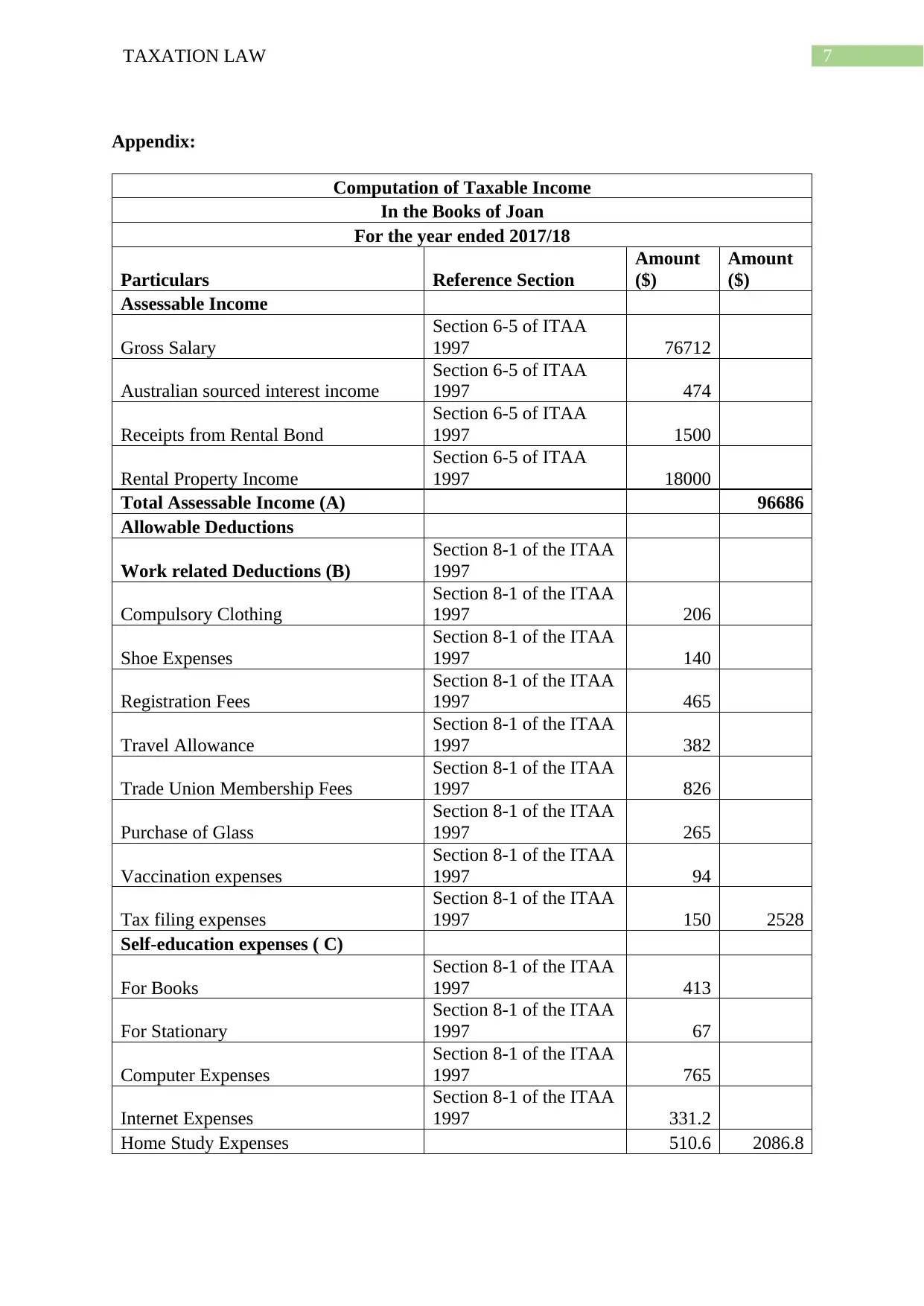
7TAXATION LAW
Appendix:
Computation of Taxable Income
In the Books of Joan
For the year ended 2017/18
Particulars Reference Section
Amount
($)
Amount
($)
Assessable Income
Gross Salary
Section 6-5 of ITAA
1997 76712
Australian sourced interest income
Section 6-5 of ITAA
1997 474
Receipts from Rental Bond
Section 6-5 of ITAA
1997 1500
Rental Property Income
Section 6-5 of ITAA
1997 18000
Total Assessable Income (A) 96686
Allowable Deductions
Work related Deductions (B)
Section 8-1 of the ITAA
1997
Compulsory Clothing
Section 8-1 of the ITAA
1997 206
Shoe Expenses
Section 8-1 of the ITAA
1997 140
Registration Fees
Section 8-1 of the ITAA
1997 465
Travel Allowance
Section 8-1 of the ITAA
1997 382
Trade Union Membership Fees
Section 8-1 of the ITAA
1997 826
Purchase of Glass
Section 8-1 of the ITAA
1997 265
Vaccination expenses
Section 8-1 of the ITAA
1997 94
Tax filing expenses
Section 8-1 of the ITAA
1997 150 2528
Self-education expenses ( C)
For Books
Section 8-1 of the ITAA
1997 413
For Stationary
Section 8-1 of the ITAA
1997 67
Computer Expenses
Section 8-1 of the ITAA
1997 765
Internet Expenses
Section 8-1 of the ITAA
1997 331.2
Home Study Expenses 510.6 2086.8
Appendix:
Computation of Taxable Income
In the Books of Joan
For the year ended 2017/18
Particulars Reference Section
Amount
($)
Amount
($)
Assessable Income
Gross Salary
Section 6-5 of ITAA
1997 76712
Australian sourced interest income
Section 6-5 of ITAA
1997 474
Receipts from Rental Bond
Section 6-5 of ITAA
1997 1500
Rental Property Income
Section 6-5 of ITAA
1997 18000
Total Assessable Income (A) 96686
Allowable Deductions
Work related Deductions (B)
Section 8-1 of the ITAA
1997
Compulsory Clothing
Section 8-1 of the ITAA
1997 206
Shoe Expenses
Section 8-1 of the ITAA
1997 140
Registration Fees
Section 8-1 of the ITAA
1997 465
Travel Allowance
Section 8-1 of the ITAA
1997 382
Trade Union Membership Fees
Section 8-1 of the ITAA
1997 826
Purchase of Glass
Section 8-1 of the ITAA
1997 265
Vaccination expenses
Section 8-1 of the ITAA
1997 94
Tax filing expenses
Section 8-1 of the ITAA
1997 150 2528
Self-education expenses ( C)
For Books
Section 8-1 of the ITAA
1997 413
For Stationary
Section 8-1 of the ITAA
1997 67
Computer Expenses
Section 8-1 of the ITAA
1997 765
Internet Expenses
Section 8-1 of the ITAA
1997 331.2
Home Study Expenses 510.6 2086.8
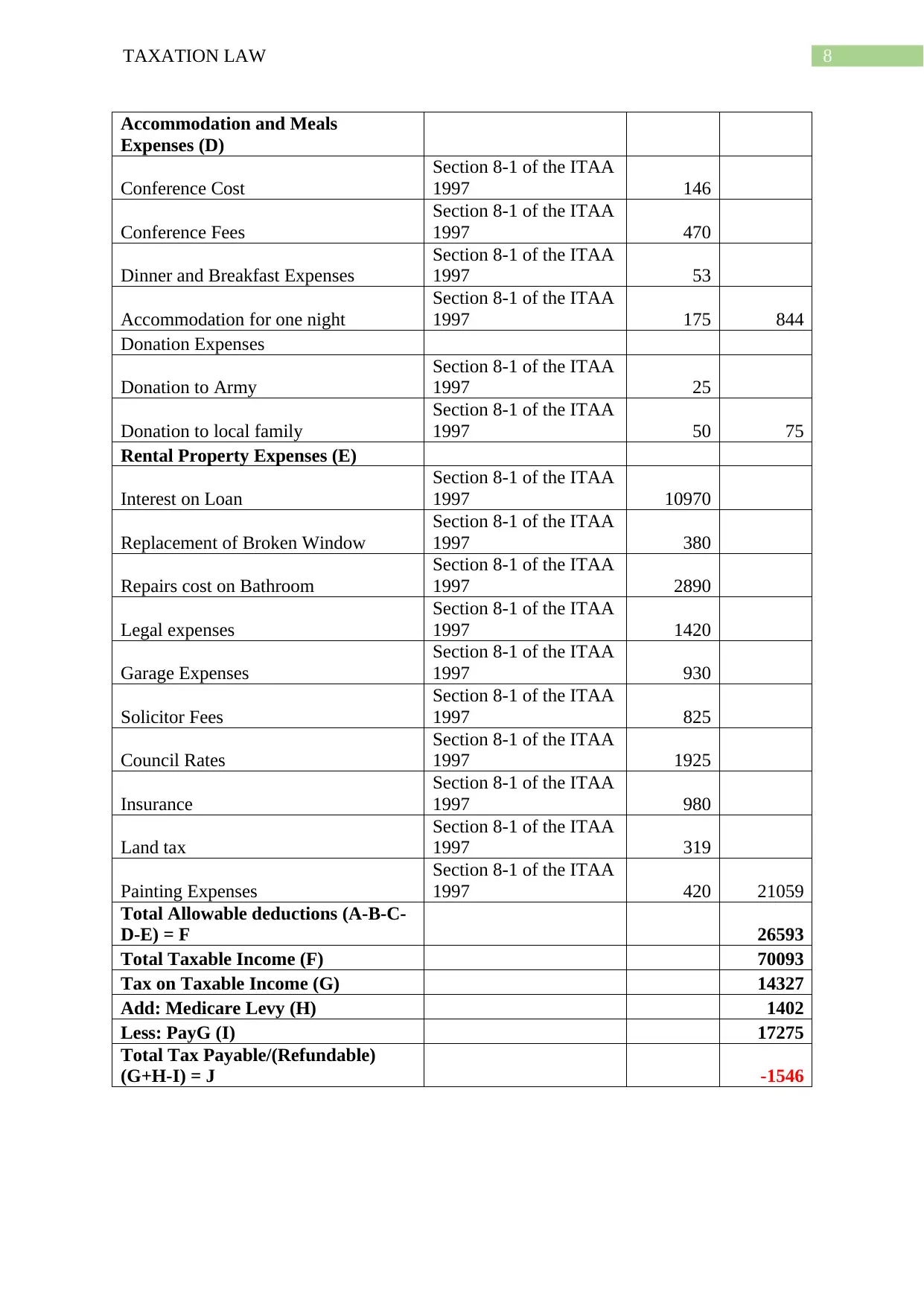
8TAXATION LAW
Accommodation and Meals
Expenses (D)
Conference Cost
Section 8-1 of the ITAA
1997 146
Conference Fees
Section 8-1 of the ITAA
1997 470
Dinner and Breakfast Expenses
Section 8-1 of the ITAA
1997 53
Accommodation for one night
Section 8-1 of the ITAA
1997 175 844
Donation Expenses
Donation to Army
Section 8-1 of the ITAA
1997 25
Donation to local family
Section 8-1 of the ITAA
1997 50 75
Rental Property Expenses (E)
Interest on Loan
Section 8-1 of the ITAA
1997 10970
Replacement of Broken Window
Section 8-1 of the ITAA
1997 380
Repairs cost on Bathroom
Section 8-1 of the ITAA
1997 2890
Legal expenses
Section 8-1 of the ITAA
1997 1420
Garage Expenses
Section 8-1 of the ITAA
1997 930
Solicitor Fees
Section 8-1 of the ITAA
1997 825
Council Rates
Section 8-1 of the ITAA
1997 1925
Insurance
Section 8-1 of the ITAA
1997 980
Land tax
Section 8-1 of the ITAA
1997 319
Painting Expenses
Section 8-1 of the ITAA
1997 420 21059
Total Allowable deductions (A-B-C-
D-E) = F 26593
Total Taxable Income (F) 70093
Tax on Taxable Income (G) 14327
Add: Medicare Levy (H) 1402
Less: PayG (I) 17275
Total Tax Payable/(Refundable)
(G+H-I) = J -1546
Accommodation and Meals
Expenses (D)
Conference Cost
Section 8-1 of the ITAA
1997 146
Conference Fees
Section 8-1 of the ITAA
1997 470
Dinner and Breakfast Expenses
Section 8-1 of the ITAA
1997 53
Accommodation for one night
Section 8-1 of the ITAA
1997 175 844
Donation Expenses
Donation to Army
Section 8-1 of the ITAA
1997 25
Donation to local family
Section 8-1 of the ITAA
1997 50 75
Rental Property Expenses (E)
Interest on Loan
Section 8-1 of the ITAA
1997 10970
Replacement of Broken Window
Section 8-1 of the ITAA
1997 380
Repairs cost on Bathroom
Section 8-1 of the ITAA
1997 2890
Legal expenses
Section 8-1 of the ITAA
1997 1420
Garage Expenses
Section 8-1 of the ITAA
1997 930
Solicitor Fees
Section 8-1 of the ITAA
1997 825
Council Rates
Section 8-1 of the ITAA
1997 1925
Insurance
Section 8-1 of the ITAA
1997 980
Land tax
Section 8-1 of the ITAA
1997 319
Painting Expenses
Section 8-1 of the ITAA
1997 420 21059
Total Allowable deductions (A-B-C-
D-E) = F 26593
Total Taxable Income (F) 70093
Tax on Taxable Income (G) 14327
Add: Medicare Levy (H) 1402
Less: PayG (I) 17275
Total Tax Payable/(Refundable)
(G+H-I) = J -1546
1 out of 9
Related Documents
Your All-in-One AI-Powered Toolkit for Academic Success.
+13062052269
info@desklib.com
Available 24*7 on WhatsApp / Email
![[object Object]](/_next/static/media/star-bottom.7253800d.svg)
Unlock your academic potential
© 2024 | Zucol Services PVT LTD | All rights reserved.




![Taxation Law: Spriggs v Federal Commissioner of Taxation [2007]](/_next/image/?url=https%3A%2F%2Fdesklib.com%2Fmedia%2Fdocument%2Fpages%2Fspriggs-taxation-law-case-page-2.jpg&w=256&q=75)
![Academy Cleaning & Security Pty Ltd v Deputy Commissioner of Taxation [2017]: Taxation Law](/_next/image/?url=https%3A%2F%2Fdesklib.com%2Fmedia%2Facademy-cleaning-security-taxation_page_2.jpg&w=256&q=75)